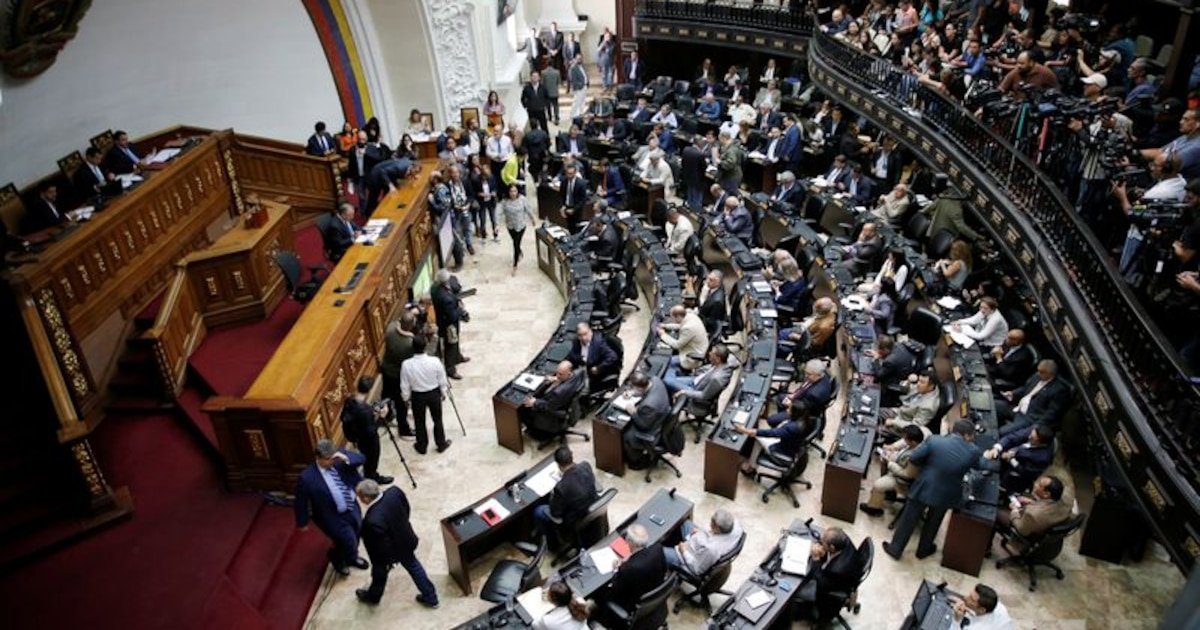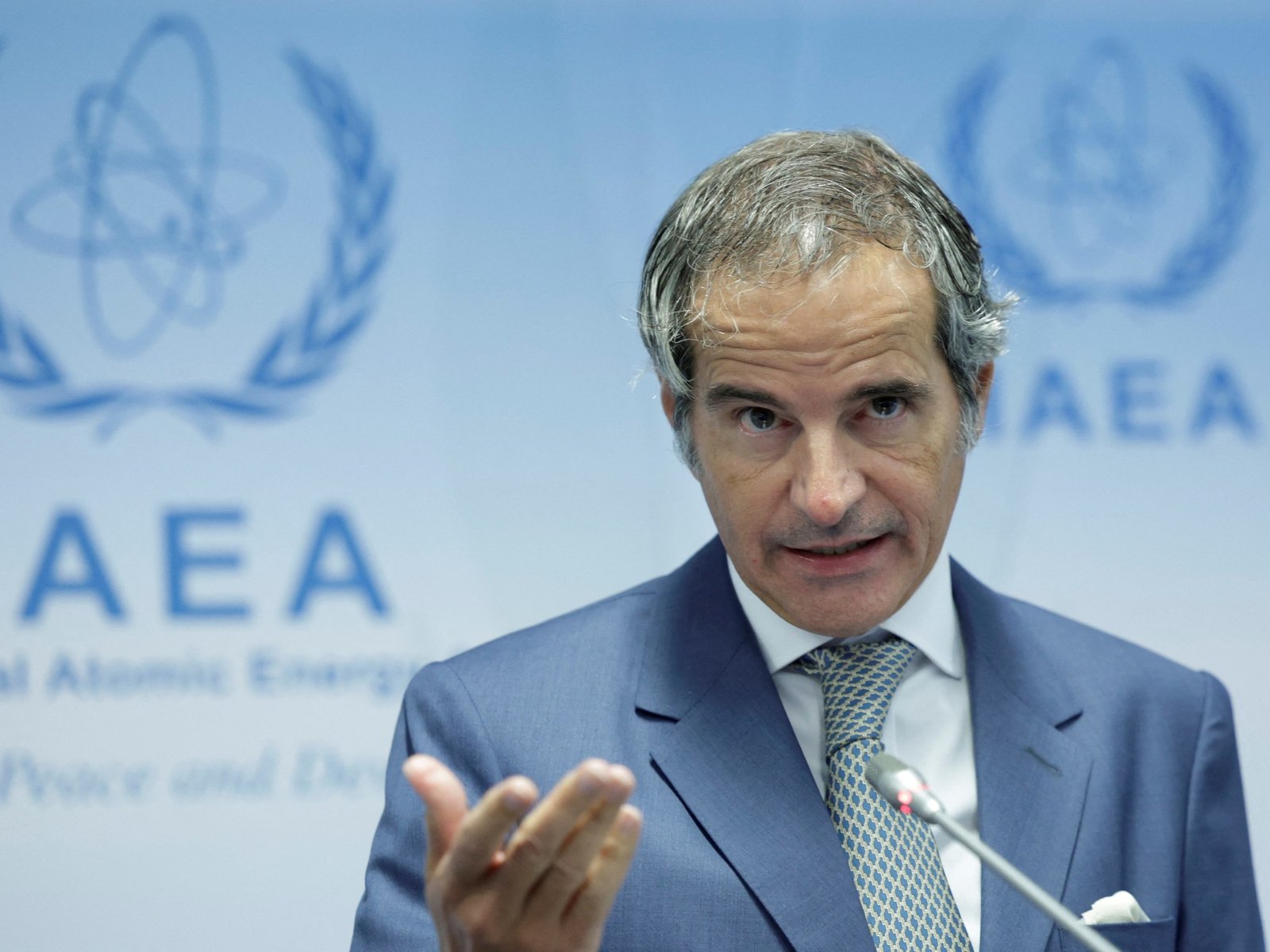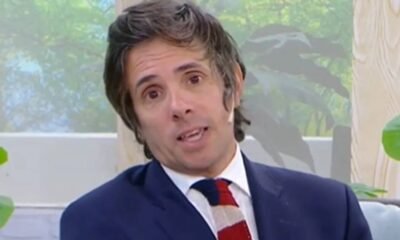INTERNACIONAL
US readies Russia sanctions over Ukraine, unclear if Trump will sign, sources say

U.S. officials have finalized new economic sanctions against Russia, including banking and energy measures, to intensify pressure on Moscow to embrace U.S. President Donald Trump’s efforts to end its war on Ukraine, according to three U.S. officials and a source familiar with the issue.
The targets include state-owned Russian energy giant Gazprom and major entities involved in the natural resources and banking sectors, said an administration official, who like the other sources requested anonymity to discuss the issue.
US-UKRAINE INCHING TOWARD MINERAL DEAL AMID LAST-MINUTE ROADBLOCKS
The official provided no further details.
It was far from clear, however, whether the package will be approved by Trump, whose sympathy for Moscow’s statements and actions have given way to frustration with Russian President Vladimir Putin’s spurning of his calls for a ceasefire and peace talks.
The U.S. National Security Council «is trying to coordinate some set of more punitive actions against Russia,» said the source familiar with the issue. «This will have to be signed off by Trump.»
«It’s totally his call,» confirmed a second U.S. official.
«From the beginning, the president has been clear about his commitment to achieving a full and comprehensive ceasefire,» said National Security Council Spokesman James Hewitt. «We do not comment on the details of ongoing negotiations.»
The U.S. Treasury, which implements most U.S. sanctions, did not respond to a request for comment.
An approval by Trump of new sanctions, which would follow the Wednesday signing of a U.S.-Ukraine minerals deal that he heavily promoted as part of his peace effort, could signify a hardening of his stance towards the Kremlin.
Rescuers work at the site of an apartment building hit by a Russian ballistic missile strike, amid Russia’s attack on Ukraine, in Kyiv, Ukraine, April 24, 2025. (REUTERS/Valentyn Ogirenko)
Since Russia launched its full-scale invasion of Ukraine in 2022 the United States and its allies have added layer upon layer of sanctions on the country. While the measures have been painful for Russia’s economy, Moscow has found ways to circumvent the sanctions and continue funding its war.
Trump «has been bending over backwards to give Putin every opportunity to say, ‘Okay, we’re going to have a ceasefire and an end to the war,’ and Putin keeps rejecting him,» said Kurt Volker, a former U.S. envoy to NATO who was U.S. special representative for Ukraine negotiations during Trump’s first term. «This is the next phase of putting some pressure on Russia.»
«Putin has been escalating,» he continued. Trump «has got the U.S. and Ukraine now in alignment calling for an immediate and full ceasefire, and Putin is now the outlier.»
Since assuming office in January, Trump has taken steps seen as aimed at boosting Russian acceptance of his peace effort, including disbanding a Justice Department task force formed to enforce sanctions and target oligarchs close to the Kremlin.
He also has made pro-Moscow statements, falsely blaming Ukrainian President Volodymyr Zelenskiy for starting the conflict and calling him a «dictator.»
Meanwhile, Steve Witkoff, Trump’s special envoy, has advocated a peace strategy that would cede four Ukrainian regions to Moscow, and has met Putin four times, most recently last week.
But three days after that meeting, Russian Foreign Minister Sergei Lavrov reiterated Putin’s maximalist demands for a settlement and Moscow’s forces have pressed frontline attacks and missile and drone strikes on Ukrainian cities, claiming more civilian casualties.
Reuters reported in March that the United States was drawing up a plan to potentially give Russia sanctions relief but Trump in recent weeks has expressed frustration with Putin’s foot-dragging on ending the invasion and last Saturday held a «very productive» one-on-one meeting in the Vatican with Zelenskiy.
The next day, Trump said in a post on his Truth Social platform that he was «strongly considering large scale Banking Sanctions, Sanctions and Tariffs on Russia» that would remain until a ceasefire and final peace deal.
CLICK HERE TO GET THE FOX NEWS APP
Volker said that Russia has been earning hard currency that funds its military through oil and gas sales to countries like India and China and that it would be «very significant» if Trump slapped secondary sanctions on such deals.
Secondary sanctions are those where one country seeks to punish a second country for trading with a third by barring access to its own market, a particularly powerful tool for the United States because of the size of its economy.
INTERNACIONAL
Diana Bellessi: “Un buen poema es llamar al mundo y que el mundo te conteste, no más”

Dentro de un rato, cuando el sol empiece a retirarse de la copa de esos árboles del patio, Diana Bellessi va a decir: “Ahora te quiero leer un poema cortito” y con ese fraseo cortado que ya es una marca, va a decir: “Hoy la muerte se hizo presente/ de un modo nuevo, no en las cosas/ sino en mí, cuerpo y mente ya lo saben/ aunque yo, no lo sé”.
Ochenta años está por cumplir la poeta y en toda esta charla hablaremos mucho de la muerte… y de la vida. Acaba de salir el segundo tomo de Tener lo que se tiene, la obra reunida de Bellessi que publica la editorial Adriana Hidalgo. Y eso -es inevitable- se lee como un cierre, como una obra acabada. El poema que lee, sin embargo, no es de estos últimos tiempos sino de 2014. Sigue Bellessi: “sube a mi hombro la muerte/ y a medio metro alea/ una tacuarita, los caseros/ se cortejan sólo a tres/ las pavitas caminan/ sobre el pasto y picotean/ a dos como si acaso/ fueran pasos de baile“.
“¿Qué vas a ver en mis libros sino mi vida?”
Y remata: “nueva cae la vida sobre ellos/ como nueva la muerte sobre mí”. Lo lee más despacio de lo que lo leemos ahora. “Como nueva la muerte…(silencio) sobre mí”. Da como un estremecimiento. Pero seguimos, en esta mesita en una planta baja del barrio de Palermo, donde Bellessi formó poetas y poetas desde que aquel lado de Juan B. Justo era más un lugar de talleres que de cafés de especialidad.
Ahora, la poeta -que ganó el Premio Nacional de Poesía en 2011- vive un poco en Buenos Aires, un poco en Zavalla -su pueblo natal- y cada vez menos en una casita en el Delta, la zona donde pasó los años de la dictadura. Pero antes de eso Bellessi supo viajar por América latina y por Estados Unidos, en un viaje juvenil que le sacudió las ideas.
En 1988, ya en democracia, sacó un libro que fue un parteaguas. Se llama Eroica y mostraba, con la morosidad y la delicia de su poesía, el deseo entre mujeres: «Cuando digo pezón ¿la mano roza las dilatadas rosas de los pechos tuyos? ¿te toco acaso?» O «Me he dejado tocar por esta extraña?»
En estos días se reedita, también, Las gemelas, el sueño, el libro donde los poemas de Bellessi se juntan nada menos que con los de Ursula Le Guin, la gran autora estadounidense de ciencia ficción. Cada una tradujo los versos de la otra.

Tener lo que se tiene se presentó el jueves en el bar y centro cultural Tano Cabrón, lleno hasta el patio, con seguidores entusiastas que aplaudían a Bellessi como a una estrella de rock, gente sentada en el piso y, adelante, figuras como las actrices Cristina Banegas y Luisa Kuliok y la cantante Liliana Herrero. Además, claro, de poetas como Paula Jiménez España y Yaki Setton.
Pero estamos acá en la casa de Palermo. La puerta que da a ese enorme patio con árboles está abierta. Dos perritas nos custodian.
-¿Cómo se ve la obra en perspectiva? Libros como Crucero ecuatorial, de 1981. ¿Te seguís reconociendo en esos libros?
-No lo pienso como algo acabado, yo siempre creo que va a haber otro libro…
-Claro, pero ves la obra hasta ahora.
-Sabés que con esto de que me voy a morir, a veces pienso que sí es toda la obra, que ya se terminó. Y que está bueno que se haya terminado. Está bueno no morirte antes de que se haya terminado y poder decir: “Ah, esto hice, mirá, no está mal”
-¿Y cómo se ven todos esos libros en fila?
-La mayoría me gustan o les tengo cariño, qué sé yo. Tenemos una buena relación.
-¿Un poeta aprende? ¿Mejora? ¿Sabe qué es escribir buena poesía, qué es un buen poema?
-Nadie sabe. Pero hay algo de cómo se emocionan los otros, básicamente. Cuando los otros se emocionan, decís: “esto está bien”. Creo que la relación siempre es con los otros. La buena poesía, la mala poesía. Yo también digo, a cada rato: “Este poema es terrible, me aburre”.

-¿Tus propios poemas?
-Los de los otros… Pero después los vuelvo a leer y puedo decir: “No era tan malo, está bastante bien”. Igual es una maravillosa relación lo que sucede entre el que escribe poemas y los poemas.
-¿Por qué?
-Porque hay una interlocución, hay un diálogo.
“La poesía sirve para recordarnos que hay vida y hay muerte. Y que no es lo mismo una cosa que la otra”
-¿Qué tiene de especial ese diálogo? ¿En qué es distinto de este?
-¿Y quién te dijo que es distinto de este? No es distinto de este, no es distinto de un diálogo de un ser humano con otro ser humano. Pero cuando hay algo que descubrís y decís: “¡Ah!, eso estuvo bien» y eso es una cosita bonita para el pecho, simplemente. ¿Y qué significa que eso estuvo bien? Significa: “Acá nos entendimos”.
-¿Y entonces?
-Entonces uno se siente menos solo. Al final, es eso.
-De esa soledad profunda.
-Claro.
-De todo lo que ves, de lo que pasa, ¿cómo sabés cuándo algo es un poema?
-Lo sé. Lo único que sé es que lo sé. Eso es un poema. Ese es un mal poema. Ese es un buen poema.
-Vivimos corriendo, vemos series en maratón, escuchamos mensajes al doble de la velocidad en que fueron emitidos. ¿Hay lugar para la poesía? ¿Cómo funciona hoy?
-Funciona como siempre ha funcionado, no hay gran diferencia. Hace doscientos años, hace dos mil años, siempre funciona de la misma manera.
-¿Y cuál es la manera?
-Llamar al mundo y que el mundo te conteste. No más, es eso.
-Vuelvo: ¿Qué es un buen poema?
-Cuando te emociona el poema es porque llamaste bien y el mundo te contestó bien. Es eso, nada más.
-En Tener lo que se tiene no veo cada libro, veo el fluir de los libros, allí veo tu vida.
-¿Qué vas a ver si no es mi vida?

La curva del tiempo
eBook
-¿Qué te pasa a vos cuando ves acá tu vida? Aparecen personajes, aparece gente, lugares…
-Sí, aparecen muchas cosas. Aparecen pajaritos que te anuncian la muerte, aparecen pajaritos que no te anuncian la muerte. Muchas cosas, no solamente personas. Estoy muy relacionada con el llamado “mundo natural”, ¿no? Por ejemplo, acá aparecieron unos colibríes, acá están haciendo un nidito. Ahí arriba está haciendo un nidito. Y yo todo el tiempo digo: “¿Es posible que estén haciendo un nidito acá en la ciudad?”. Sí, está haciendo un nidito en la ciudad.
-¿Y?
-Es completamente mágico. Acá en el patiecito, acá arriba, en la ramita, el colibrí está teniendo su pichoncito chiquitito, chiquitito. Si sucede eso, ¿cómo no van a suceder otras cosas? ¿Cómo yo no me voy a preguntar para qué sirven los poemas?
-¿Sirven? ¿Tienen que servir?
-Yo creo que todo lo que he escrito en mis poemas sirve para algo.
-Muchos años estuviste muy ligada a los poetas jóvenes. ¿Los estás leyendo ahora?
-Estuve muy ligada y ahora no, casi no leo a los jóvenes. Bueno, casi no leo ni escucho a nadie, estoy metidita ahí en Zavalla y no salgo del pueblo. Pero sí tuvimos mucha relación y me encanta, fueran buenos o fueran malos, no importa. ¿Por qué? Porque para algo debe servir la poesía. Y creo que la poesía sirve para recordarnos que hay vida y hay muerte; es eso. Y que no es lo mismo una cosa que la otra.
INTERNACIONAL
Rafael Grossi: «La ONU sigue siendo indispensable y no debemos confundir críticas con el deseo de destruirlas»
INTERNACIONAL
Un abecedario para restablecer la democracia: segunda parte

En días pasados planteamos la necesidad de “Un Abecedario para restablecer la democracia”, convencidos de que a pesar de sus incontables beneficios se le “zarandea” de un lado a otro no pasando, por lo menos, en algunos cuantos países por su mejor momento. Entiéndase lo analizado como “Consideraciones preliminares” y que a partir de ahora se analizarán en este y posteriores ensayos el contenido de las letras del Abecedario. Empezamos, por consiguiente, con el:
Letra “A”
Capítulo I
A la cual calificamos en las “Consideraciones preliminares” como “aquella integrada por diputados elegidos por el pueblo en votación universal y secreta, a fin de que en ejercicio de la potestad que al último, como es bien sabido, le es soberana y a través de una constitución se estatuya, organice, discipline al Estado y se reafirmen los fines que le son propios y que realmente se hagan realidad. Al texto constitucional, en atención a su jerarquía, como ley superior de un país, se le denomina, asimismo, “Carta Magna, Ley Suprema y Ley de Leyes. Acotamos, también, con relación a Venezuela, que no ha escapado de la tendencia propia de los países de América Latina, a los cuales “erga omnes” les ha costado crearse, componerse y estabilizarse con la eficiencia debida con arreglo a lo estatuido por la asamblea constitucional, a la cual, incluyendo sus consecuenciales derivados, más bien se le ha asumido como una pelota de futbol que va y viene de arco en arco, pero sin entrar en ninguno de los dos. Ha de atribuirse, por tanto, significado, como se les ha ocurrido a estudiosos del tema, a la frase “la necesidad constituyente”, ilustrativa en lo concerniente a que si no nos enseriamos, alrededor de la burla proseguiremos con la diversión. Nosotros, conscientes del “caos constitucional”, hablaríamos más bien de “una determinante urgencia de la necesidad”. Pues, ha de realzarse la urgencia, por demás imperativa, del tratamiento que la crisis demanda.
Nos inclinaríamos, igualmente, en aras de una mayor precisión, por afirmar que “el propósito” de una Asamblea Constituyente “es la de edificar a una república”, lo cual no deja de complementar la apreciación con respecto al “balón de futbol”, pues, para la Academia de la Lengua Española “el sustantivo “propósito”, está referido al “ánimo o intención de hacer algo”, pero, asimismo, “el no hacerlo”, hipótesis no ausente en nuestra historia, ya que a lo largo de ella nos cuesta y bastante constatar una profusa diversidad de intentos por edificarnos como “república”, lo cual pareciera conducir a que no han sido “asambleas constitucionales serias”, más bien, tentativas alimentadas por el “ánimo o intención de no hacer algo”. Esto es, la segunda interpretación que al sustantivo “propósito” atribuye la Real Academia.
Algunas lecturas, por demás interesantes, entre ellas, la del Doctor en Ciencia Política de México, Sergio Ortiz Leroux (República y republicanismo, enero-abril 2007), sustentan que la creación de una república se ha confrontado con dos tipos de “republicanismo”, el “democrático-radical”, conforme al cual no se teme a la democracia y se sustenta que la idea del bien común es coincidente con la ecuación “el gobierno del, para y por el pueblo”. Se le identifica, asimismo, como “el de los pobres”. La segunda aproximación, el gobierno de los ricos, se alimenta en la oligarquía, en la autocracia y en “un único líder o grupo de individuos”, por lo que es escasa “la tolerancia al pluralismo político”. En lo conexo a la república se escribe que más bien ha de asociársele con la defensa de la libertad, a fin de “decidir quiénes y cómo queremos ser”, excluyendo, por tanto, la dominación, esto es, a ser gobernado por otro. No serlo conduce a autogobernarnos.
Esta segunda tipología de “republicanismo”, para Ortiz Leroux, es la de “una sociedad de propietarios”, y por tanto, de quienes dependen aquellos que no lo son, hipótesis a la que se cuestiona “que quien vive a merced de otro no es libre sino esclavo”, por lo que la ciudadanía a edificar, además de proporcionarnos derechos vinculados a la libertad, nos reclame obligaciones. En el republicanismo liberal-democrático, el bien común está asociado con el gobierno de las leyes y con la noción moderna de representación. La participación del pueblo es, por supuesto, importante, pero limitada a la elección de los gobernantes. No participa directamente en el gobierno, apreciación que conduce a preguntarse si pueden existir “repúblicas no democráticas”.
En esta modalidad republicana se reafirma la autonomía del individuo frente al Estado y el predominio de sus derechos individuales, particularmente, la propiedad, lo cual se evidencia al indagar con respecto a sus deberes para con la comunidad, limitados, en principio, al interés de sus propios derechos mediante el sufragio. La participación de los individuos en la esfera pública se reduce, consecuencialmente, a la mera expresión de los intereses privados mediante el voto, terciando las preferencias de los electores en puestos de representación. En la asamblea obviamente los derechos de los pudientes tendrán preferencia.
Las consideraciones anteriores corroboran que “edificar a “una república” es cosa seria”, por lo que, también, ha de serlo “una Asamblea Constituyente”. Y no menos determinante la representación popular que la componga. Consecuencialmente, ha de concluirse en que “no todos los países son repúblicas o que, por lo menos, las hay distintas y hasta opuestas”.
Ante el escenario tengamos en cuenta “la problemática en la cual se ha desenvuelto “la asamblea constituyente” en Venezuela”, cuyo análisis, al analizarse la numerosa diversidad de tentativas provoca determinar si han sido sinceras o “disfrazadas”. En efecto, desde nuestra independencia en 1811 hemos tenido formalmente 25 constituciones, si incluimos nuestra Acta de Independencia de 5 de julio de 1811 y la Constitución de la Gran Colombia de 1821. Se acota al respecto que el Acta de Independencia no se clasificaría como una Constitución, sin embargo, para estudiosos del tema sí lo es, pues es la que nos constituye como pueblo, manifestada aun antes de la independencia (Grupo de estudio integrado por el profesor de derecho constitucional, Gustavo Planchart Manrique, su coordinador y Manuel Caballero, Marianela Ponce, Manuel Pérez Viva Vila, Nikita Harwich Vallenilla, Fundación Empresas Polar).
En aras de la apreciación, leemos que la referida Acta de Independencia lleva incita dos providencias, derivadas del ejercicio de la soberanía: 1. Poner término al régimen colonial español y 2. La determinación de principios conforme a los cuales nos apartaríamos del estatus de colonia, para instituirnos en “república”. Circunstancias que en criterio de respetados analistas coadyuvan a calificar a la referida “acta” como derivada de “una asamblea constituyente”. La primera, deberíamos pensarlo, de una cadena sucesiva que ilustran a nuestra historia, tantas, que resulta por demás difícil encontrar una respuesta idónea al ¿Por qué? Un largo debate con el cual coexistimos desde 1811 hasta nuestros días.
Es recomendable, pues, admitir que los venezolanos hemos propendido, como en un número importante de países, a “una institucionalidad republicana”. Y, asimismo, aceptamos que la metodología ha sido “una asamblea constituyente” y en todos los supuestos, a pesar de que así, formalmente, no se le haya calificado. Esto es, que aplicando el criterio material (libertad, igualdad, dignidad y justicia) no otra conclusión pareciera posible.
En el compendio “Constituciones de Venezuela”, digno de elogiar, se hace una adecuada selección de los textos constitucionales a lo largo del acontecer venezolano, en procuración de “una república” seria, estable y eficiente. Estamos seguros de que el excelso profesor venezolano Allan Brewer Carías, coordinador del trabajo, así como los integrantes del equipo que le acompañó, han debido preguntarse ¿Por qué tantas constituciones? Lamentablemente no deja de ser difícil contestar, no obstante, estar a las puertas del año 2026 del presente siglo. Pero, asimismo, con respecto a las razones para haberse tirado por la ventana, hecha añicos, la Constitución de 1961, cuya estabilidad se prolongó durante 4 décadas y con ella la democracia más estable y próspera con la cual hemos contado. Sustituyó, como leemos, a la del 11 de abril de 1953 y refleja las tendencias todavía actuales de la democracia occidental al tomar en cuenta:
1. Las necesidades contemporáneas han orientado hacia un socialismo intervencionista, en búsqueda de un equilibrio estable y fructífero con el antiguo fondo liberal,
2. El espíritu de la nueva Carta traduce un liberalismo totalmente ausente de la Constitución anterior, que concretaba la cabal expresión de una dictadura,
3. Ha de advertirse que fue aprobada por un “congreso” electo popularmente, a raíz del fin del régimen antidemocrático.
No cuesta, por consiguiente, mucho esfuerzo para que concluyamos que atendiendo a un criterio material, la Constitución democrática de 1961 fue resultado del ejercicio de la función constituyente. Esto es, “el Congreso ejerció la función constituyente”. Cómo que hubiese sido una “asamblea”.
Es por demás conocido que esa constitución fue derogada por “una asamblea constituyente”, la cual establecería una sociedad democrática, participativa y protagónica, un Estado de justicia, la consolidación de la libertad, la independencia, la paz, la solidaridad, el bien común, la integridad territorial, la convivencia y el imperio de la ley, el aseguramiento del derecho a la vida, al trabajo, a la cultura, a la educación, a la justicia social y a la igualdad… La República, pasó a llamarse “Bolivariana” y… fundamenta su patrimonio moral y sus valores de libertad, igualdad, justicia y paz internacional… Venezuela, nominalmente, se constituye en un Estado democrático y social de Derecho y de Justicia, que propugna como valores … la vida, la libertad, la justicia, la igualdad, la solidaridad, la democracia, la responsabilidad social y en general, la preeminencia de los derechos humanos, la ética y el pluralismo político… El gobierno… es y será siempre democrático, participativo, electivo, descentralizado, alternativo, responsable, pluralista y de mandatos revocables…. la Constitución es la norma suprema y el fundamento del ordenamiento jurídico.
Venezuela, cuesta dudarlo, está hoy a las puertas de una nueva “Asamblea Constituyente” y para el mismo fin, o sea, la elaboración y promulgación de una, también, nueva, Constitución, la número 26. Pensábamos, incluyendo a unos cuantos asambleístas de la de 1999, que la de 1961 sería la última, pues las cartas magnas requieren del tiempo necesario para consolidarse, acudiéndose a las enmiendas y a las reformas con la finalidad de adecuarlas a situaciones reales que vayan surgiendo. No un “plumazo” fue suficiente, hábito en Caracas, donde el escribano lo ha hecho nada más y menos que en 25 ocasiones. Y que lo más grave es preguntarnos ¿por qué y para qué?
Las respuestas, lamentablemente, más que difíciles, por no pensar que parecieran no existir. Las causas para ser como somos, si es que allí pudiera encontrarse algún motivo de “nuestra incontinencia institucional”, algunos estudiosos la han identificado en las limitaciones que nos impusiera la colonización española, argumentación refutada duramente en el libro “Nada por lo que pedir perdón”, de la autoría de Marcelo Gullo Omodeo, en cuyo prólogo escrito por Carmen Iglesias, Directora de la Real Academia de la Historia, manifiesta que el autor está en lo cierto cuando afirma que “los españoles llevaron a América su cultura, su religión, su lengua, su organización social, los valores de la civilización occidental, todo lo que eran y tenían”. Portaron consigo un cuerpo legislativo, las leyes de Indias y otras Disposiciones sucesivas, que permitían recurrir ante los tribunales de justicia a los súbditos del Rey, bajo la potente protección de la Monarquía Hispana, también, denominada Española. En la lectura de Don Marcelo pareciera inferirse que somos nosotros quienes deberíamos hacer genuflexiones a los españoles y no lo opuesto.
Las complejidades derivadas de la lucha entre unos y otros, etiquetadas desde antaño en la Asamblea Nacional de Francia, como “la derecha y la izquierda”, parecieran que hubiesen sido estatuidas más bien por un Ser Superior y para la eternidad. Pues, se les sigue usando y en lo que respecta a Caracas en más de una ocasión. En rigor, no han dejado de enredarnos y no dejaría de ser objetivo expresar que no nos han afectado. Aunque parezca mentira se le prosigue usando y que transcurridas ya tantas centurias, en las definiciones de los poderosos y afincados fuertemente en principios religiosos y profesionalmente mejor preparados y en el denominado proletariado, al cual integra “el trabajador que no posee medios de producción y que obtiene su salario de la venta del propio trabajo”, para unos cuantos, “el verdadero pueblo”, titular de la soberanía y de la constitucionalidad.
El próximo ensayo estaría referido, conforme a las pautas del abecedario, a “la Constitución, Ley Suprema y Ley de Leyes”. Genuina manifestación de la “Asamblea Constituyente”. Capítulo II del ensayo.
@LuisBGuerra

 POLITICA3 días ago
POLITICA3 días agoLa financiera vinculada a “Chiqui” Tapia utilizó 42 empresas falsas para lavar $72 mil millones: la lista completa

 ECONOMIA2 días ago
ECONOMIA2 días agoANSES confirmó aumento y bono de diciembre: cuánto cobran jubilados y beneficiarios de asignaciones

 CHIMENTOS2 días ago
CHIMENTOS2 días agoLa polémica denuncia sobre Robertito Funes Ugarte por estafa: “Trató de no pagar la comisión a una trabajadora inmobiliaria por un departamento y la bloqueó”















